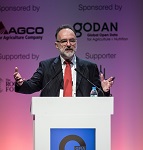Sustainable project management: how we transformed fishing through data

It’s World Environment Day and it’s high time that project management went green. With the rising demand to meet the needs of over 7.5bn people, it is largely the responsibility of businesses across the globe to address climate change and global warming by finding the means to run more sustainable projects.
Not considering the environmental impacts of a project can be detrimental to the project itself. GODAN stands for Global Open Data for Agriculture and Nutrition. It’s a UN-backed project to utilise data to promote sustainability. In the field of agriculture, companies are looking for new and innovative ways to improve practises, leveraging new resources while ensuring sustainability of production methods and reducing energy waste.
Data can reduce waste
The sector is constantly looking for new ways to improve practises. Increased access to relevant data such as historical weather patterns and food consumption information would result in more informed decisions by farmers and the depletion of wasted resources, such as man power and energy.
A sustainability project completed with the fishing community in South Africa, in collaboration with the University of Cape Town, demonstrates the adoption of a clear sustainability strategy to improve the practises of fisheries all over South Africa and reduce energy wasted. It also demonstrates the sustainability of the project itself.
The difference an app makes
The project enabled the design and development of a suite of mobile accessible apps to support and improve the small-scale fisheries industry. The free Abalobi Fisher downloadable app was able to provide valuable information about the weather and climate from open sources. It also records data about fishing practises and catch information.
As a result, fishing techniques became more efficient and the amount of waste produced through the unnecessary usage of tools and energy decreased. Fishermen stopped wasting resources by avoiding poor fishing conditions. The project exemplified how access to open data has helped South Africa improve their fishing practises, making processes more organised and efficient by cutting down paperwork and time, improving their economic aspects and livelihoods and saving energy.
Building sustainability into projects
While open data projects are low energy in comparison to construction projects, it is important for managers to consider the sustainability aspect in all their projects in the long-term. Assessing your current project sustainability will enable you to find the best opportunities for improvement and measure progress of your sustainability initiative. You must first consider whether the concept of sustainability applies to a project in the first place, then adopt a strategy in which the goals of the initiative are defined for improving sustainability and a standard is adopted to guide further efforts. For managers to make their projects more sustainable, you must constantly look for new and innovative ideas to achieve your sustainability goals.
Set team goals
The team that works on a project must own the environmental impact of the work they do – the closer they feel towards the impact of the project, the harder they will work. Practising what we preach will encourage others, including our partners, to prioritise their own sustainability practises and thus, make their projects more efficient. Keep this in mind beyond World Environment Day, and you can really make a difference.


0 comments
Log in to post a comment, or create an account if you don't have one already.